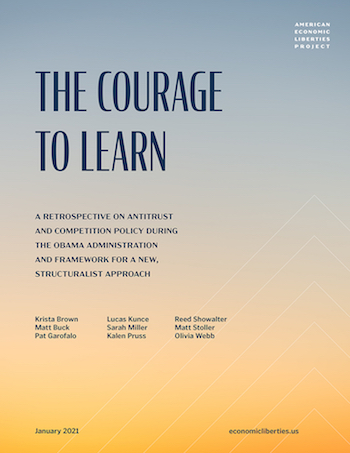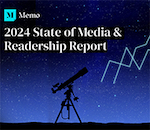A continuing concentration of advertising on platforms like Google and Facebook is the primary reason for the newspaper industry’s economic collapse, according to a new report by the American Economic Liberties Project.
The organization’s “The Courage To Learn” report provides an overview of how our antimonopoly laws and other current antitrust policies have contributed to what the authors refer to as a “corporate concentration crisis” in the U.S.
Specifically, the report details what effects under-enforced economic competition policies have had on the news publishing industry, as well as how Google and Facebook were allowed to amass power by essentially monopolizing the online advertising market and siphoning away the revenues that once flowed primarily to newspapers.
 |
Traditionally, advertisements used to be purchased directly from news outlets or through third parties such as ad agencies. Once America’s media landscape began shifting online, however, ads were increasingly bought and sold in an automated third-party market controlled by Big Tech, which severed the relationship between publisher and customer and allowed entities such as Google to take an increasingly larger share of every ad dollar spent.
That practice has effectively taken over the media buying market, and now comprises 86 percent of the online advertising space bought and sold, presenting serious economic challenges for newspaper companies.
At the same time, Google and Facebook, which both benefitted from the 2008 financial crisis that savaged ad markets as well as the Internet’s shift from desktop to mobile, have relied on “an explicit strategy of monopolization” and took advantage of a lax FTC merger policy environment, with Google acquiring more than 150 companies between 2009 to 2016 and Facebook acquiring more than 50 companies (including Instagram and WhatsApp) during this time period.
The result? Google and Facebook are now two of the largest corporations in the world, effectively controlling 77 percent of local newspaper advertising revenue. Google is easily one of the world’s largest sellers of ad space, accounting for nearly $22 billion in advertising last year, more than any media company on the globe. Facebook owns more than 70 percent of the social media market share, with ad revenue of nearly $70 billion in 2019.
Meanwhile, advertising revenue for the U.S. newspaper industry, which peaked at about $50 billion in 2005, has since been in a free fall, standing at an estimated $14 billion in 2018.
The report also blamed newspapers’ demise on an increase of buyouts by predatory investment companies, strip-mining local news ecosystems of their remaining assets and giving rise to “news deserts,” or communities in the U.S. without access to a local paper. Private equity firms routinely purchase news companies, slash operations and lay off staff until these publications are profitable and then sell them, a process akin to flipping houses. A University of North Carolina at Chapel Hill study last year found that more than a quarter of the country’s newspapers have disappeared in the last 15 years, accounting for a loss of about 212 daily titles and 1,943 non-dailies since 2004.
The American Economic Liberties Project, which launched last year, is an organization dedicated to addressing the increased concentration of corporate and economic power in the United States.


 Trump Media & Technology Group today reported a $58.2M net loss on $4.1M in 2023 revenues, a disclosure that drove its stock price down 22.6 percent to $47.96.
Trump Media & Technology Group today reported a $58.2M net loss on $4.1M in 2023 revenues, a disclosure that drove its stock price down 22.6 percent to $47.96. Barry Pollack, an attorney at Wall Street’s Harris St. Laurent & Wechsler, has registered Julian Assange as a client with the Justice Dept. “out of an abundance of caution.”
Barry Pollack, an attorney at Wall Street’s Harris St. Laurent & Wechsler, has registered Julian Assange as a client with the Justice Dept. “out of an abundance of caution.” Paramount Global to slash 800 jobs in what chief executive Bob Bakish calls part of an effort to “return the company to earnings growth"... Rolling Stone editor-in-chief Noah Shachtman is exiting at the end of the month due to disagreements with chief executive Gus Wenner over the direction the magazine is taking... The New York Times broke the $1 billion barrier in annual revenue from digital subscriptions in 2023... Press Forward is investing more than $500 million to strengthen local newsrooms.
Paramount Global to slash 800 jobs in what chief executive Bob Bakish calls part of an effort to “return the company to earnings growth"... Rolling Stone editor-in-chief Noah Shachtman is exiting at the end of the month due to disagreements with chief executive Gus Wenner over the direction the magazine is taking... The New York Times broke the $1 billion barrier in annual revenue from digital subscriptions in 2023... Press Forward is investing more than $500 million to strengthen local newsrooms. The majority of news articles are read within the first three days of publication, according to a recent report.
The majority of news articles are read within the first three days of publication, according to a recent report. The Los Angeles Times gives pink slips to 115 people or 20 percent of its newsroom staff... TIME is also laying off about 30 employees, which is approximately 15 percent of its editorial staff... The Baltimore Banner, which was launched by Stewart Bainum in 2022 after he failed to buy the Baltimore Sun, added 500 subscribers per day in the three days following Sinclair Broadcast Group's deal to purchase the Sun.
The Los Angeles Times gives pink slips to 115 people or 20 percent of its newsroom staff... TIME is also laying off about 30 employees, which is approximately 15 percent of its editorial staff... The Baltimore Banner, which was launched by Stewart Bainum in 2022 after he failed to buy the Baltimore Sun, added 500 subscribers per day in the three days following Sinclair Broadcast Group's deal to purchase the Sun.


 Have a comment? Send it to
Have a comment? Send it to 
No comments have been submitted for this story yet.